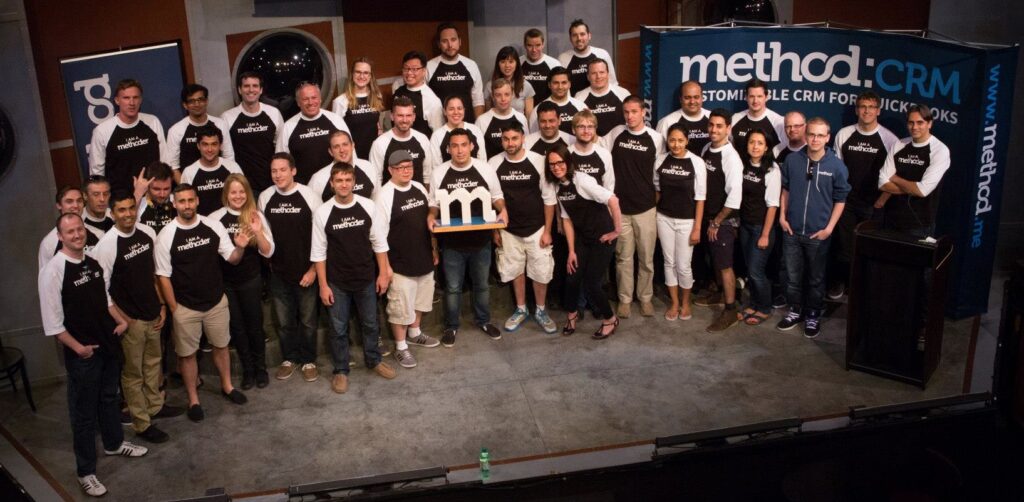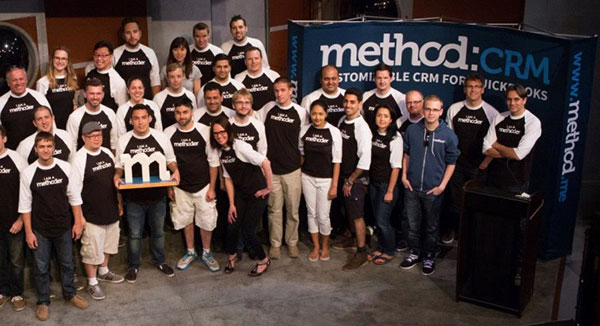[wpsocialite url=”https://smoothhiring.com/business-tips/paul-jackson-agility-key-methods-sales-success/”]

In 2010, when Method Founder and CEO, Paul Jackson, set out to build a sales team for his software business, he made a costly assumption based on a widely held notion of sales. Turning his software solution into a top-rated app would require Paul to turn that assumption on its head.
Method’s cloud-based customer relationship management software, Method:CRM, integrates with Intuit’s QuickBooks accounting software. It’s specifically designed for small to medium-sized businesses (SMBs) and is fully customizable, so any business can set up a CRM suited for their unique workflow. But, for Method’s sales team, this product benefit creates the challenge of approaching each customer differently, because what works for one customer may not work for another.
The Costly Assumption
Paul’s first attempt to meet this sales challenge was to hire what he refers to as “universal reps”—multi-skilled salespeople who would manage the entire customer experience, from onboarding to account management to support. For Method, this meant that when a business would sign up for a 30-day free trial (and become a lead for Method), the sales rep would manage the lead’s initial CRM setup as well as provide ongoing account support and customization guidance for the duration of their relationship with Method.
The concept of a universal rep is a proven approach that has worked in other industries to build strong, lasting client relationships. The underlying principle is that customers prefer to develop a relationship with a single contact at a company, rather than be bounced around to different people. It was a convincing notion and Paul assumed it would work for Method.
Urgent Help
To his surprise, Paul’s universal rep plans didn’t pan out with the level of success he had anticipated and businesses that had signed up with Method weren’t receiving the top-notch experience Paul had envisioned for his customers. For example, a rep would be on a long two-hour call helping a customer create a custom workflow, while another customer would call in repeatedly trying to get urgent help to log into the system.
As Paul thought about what to do, it hit him that he had approached the sales problem the wrong way—trying to plug someone else’s model into Method was never going to work. What he needed was something that fit with the unique journey his customers were on. And, to find out exactly what sales solution to build, he needed to walk in his customers’ shoes—to experience what they were experiencing. Only then would he know how to lead them seamlessly from a free trial to a paid plan.
The irony for Paul was that customer insights are the cornerstone to Method’s approach to building their software. It’s central to their whole development philosophy, which is based on something known in the software industry as Agile development. The more he thought more about it, Paul realized he could in fact apply the whole Agile philosophy to solving his company’s sales problem. If it was helping Method build a killer app, why not use it to build a killer sales team?
Changes on the Fly
As the name implies, Agile development is about adapting quickly. Instead of trying to get the design of the product perfect upfront, developers design and test and get customer feedback all at the same time—and use the information they gather to iterate and make changes on the fly. The result: you end up giving your customers what they need, when they need it. And that was the big problem with Paul’s concept of a universal rep. It wasn’t what his customers needed.
So, when Paul focused on understanding the customer journey, he discovered that having the same person to talk to wasn’t what his customers cared about. What they really wanted was to get someone knowledgeable on the phone in the area they currently needed help with. And that wasn’t always happening because the reps who were good at helping someone in the initial free trial phase weren’t the best at providing in-depth customization or ongoing support.
In the spirit of getting Agile, Paul decided to adapt quickly. He immediately ditched the universal rep role, and instead began hiring for three different roles—a sales rep to handle initial set-up, a rep for support, and a consultant to work on customization.
Something Even Better
The new approach was a big step in the right direction. Method began delivering a better experience for their customers and more people were converting from the free trial into a paid plan. But Paul sensed they could do better. As he kept his eye on the customer experience he noticed that many still weren’t seeing the value in the Method app. They weren’t having their “Aha” moment. Paul realized that to fully solve the sales problem, he had to focus here, on this part of the customer’s journey—he had to make sure Method delivered those critical revelatory moments.
And to do that, Paul knew what he needed—salespeople who possessed a key trait: the ability to listen, tailor, and ultimately show. Only people who excelled at showing would be able to demo the app in a way that clearly demonstrated to customers how Method could help them.
Top Rated
So, Paul adapted again and began to invest more heavily in bringing on experts at showing. After building out his sales team with this new strength things began to really click. Retention soared and the lifetime value of each customer grew. Method began to convert customers from trial to paid at a world-class rate. Furthermore, the app became the top rated app in the Intuit App Center, where it now also has the highest number of reviews, the vast majority of which tout Method’s exceptional service—service delivered by the sales team.
So, can Paul step back from the sales challenge now? No. And that’s because the app will change, the world will change, and customer needs will change—and that means the right sales approach will have to change too. If that means completely overhauling the sales solution again and again, that’s what Paul and his team at Method will do. When you’re Agile, the evolution never stops.
For more ideas on how to build a leading sales team, see:
How Mike McDerment dramatically increased sales at FreshBooks


2 comments on "Paul Jackson: Why Agility Is the Key to Method’s Sales Success"
Novel Remodeling
-Pretty amazing story! As a contractor with reps of our own, we focus on helping homeowners have 2 different types of reps. Those that start projects and those that handle the project after. Maybe a 3rd rep is needed!
Good Point and good article!
Paul Jackson
-@Novel – glad you appreciated the interview. The thing we learnt was to iterate based on the needs of our unique business. Every business is unique, so what works for one company may not work for others. Our job as leaders of our businesses is to simply the work of our team in order to server our customers. So, in other words, only add a 3rd rep if it makes sense for your business, and reduces complexity.